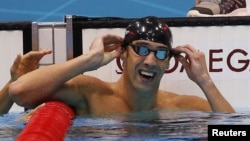LONDON — Superstar American swimmer Michael Phelps won what he has made clear was the last individual Olympics race of his storied career.
What more can be said or written about Michael Phelps? The media and fans alike are running out of words to describe his performances and achievements.
His final individual race at the London Games, the men’s 100-meter butterfly, was a thriller. Coming off the wall after the first length of the pool, he was seventh of the eight swimmers, and it appeared certain there was no way he could win, and probably not even get a medal.
But somehow he dug deep into his reserve, passed everyone in front of him and touched the wall first for the gold medal in a time of 51.21 seconds.
"I’m just happy that the last one was a win," he said. "That’s all I really wanted coming into the night and so we can smile and be happy and, yeah, I don’t know, it was fun."
Getting the silver medal, .23 seconds behind Phelps was South African Chad Le Clos, who had edged him in the 200-meter butterfly. Russian Evgeny Korotyshkin took the bronze.
Phelps extended his career Olympic record to 21 medals, with a record 17 gold.
For an Olympics that had a rough beginning for Phelps, with a fourth-place finish in the 400-meter individual medley, he said he cannot be disappointed.
"My start of the meet wasn’t what we wanted, but you know I seemed able to pick up some steam at the end of the meet, and I was able to finish with two individual golds," he said. "You know to be able to finish that way, you can’t really finish any better, so I’m very pleased with how everything finished."
In the women’s 200-meter backstroke, American Missy Franklin took the gold medal with a world record time of 2:04.06.
"I definitely knew that I took it out really fast [at the beginning] because it hurt so bad that last 25 [meters], but that’s the part about it that I love, is knowing that I’m pushing myself past the limit that I have made. And it means the world to me. And I just wanted to get a fast time tonight. And that just happened to get me a gold medal and a world record," she said.
Franklin has become the star of the U.S. women’s swim team. Only 17 years old and qualifying for seven events, this was her third gold medal of these games, and she also has a bronze.
Russian Anastasia Zueva took the silver medal, nearly two seconds behind Franklin, and American Elizabeth Beisel won the bronze.
The youngest swimmer on the U.S. team, 15-year-old Katie Ledecky, made an impact of her own, winning gold in the women’s 800-meter freestyle by more than four seconds. Florent Manaudou of France won gold in the men’s 50-meter freestyle.
Michael Phelps' stellar Olympics career is not quite over. He is scheduled to race in the 4x100 medley relay here Saturday, the last night of swimming finals at these Olympics. It is an event the Americans have never lost, as Phelps aims to cap his already record-setting career with another gold medal.
What more can be said or written about Michael Phelps? The media and fans alike are running out of words to describe his performances and achievements.
His final individual race at the London Games, the men’s 100-meter butterfly, was a thriller. Coming off the wall after the first length of the pool, he was seventh of the eight swimmers, and it appeared certain there was no way he could win, and probably not even get a medal.
But somehow he dug deep into his reserve, passed everyone in front of him and touched the wall first for the gold medal in a time of 51.21 seconds.
"I’m just happy that the last one was a win," he said. "That’s all I really wanted coming into the night and so we can smile and be happy and, yeah, I don’t know, it was fun."
Getting the silver medal, .23 seconds behind Phelps was South African Chad Le Clos, who had edged him in the 200-meter butterfly. Russian Evgeny Korotyshkin took the bronze.
Phelps extended his career Olympic record to 21 medals, with a record 17 gold.
For an Olympics that had a rough beginning for Phelps, with a fourth-place finish in the 400-meter individual medley, he said he cannot be disappointed.
"My start of the meet wasn’t what we wanted, but you know I seemed able to pick up some steam at the end of the meet, and I was able to finish with two individual golds," he said. "You know to be able to finish that way, you can’t really finish any better, so I’m very pleased with how everything finished."
In the women’s 200-meter backstroke, American Missy Franklin took the gold medal with a world record time of 2:04.06.
"I definitely knew that I took it out really fast [at the beginning] because it hurt so bad that last 25 [meters], but that’s the part about it that I love, is knowing that I’m pushing myself past the limit that I have made. And it means the world to me. And I just wanted to get a fast time tonight. And that just happened to get me a gold medal and a world record," she said.
Franklin has become the star of the U.S. women’s swim team. Only 17 years old and qualifying for seven events, this was her third gold medal of these games, and she also has a bronze.
Russian Anastasia Zueva took the silver medal, nearly two seconds behind Franklin, and American Elizabeth Beisel won the bronze.
The youngest swimmer on the U.S. team, 15-year-old Katie Ledecky, made an impact of her own, winning gold in the women’s 800-meter freestyle by more than four seconds. Florent Manaudou of France won gold in the men’s 50-meter freestyle.
Michael Phelps' stellar Olympics career is not quite over. He is scheduled to race in the 4x100 medley relay here Saturday, the last night of swimming finals at these Olympics. It is an event the Americans have never lost, as Phelps aims to cap his already record-setting career with another gold medal.






